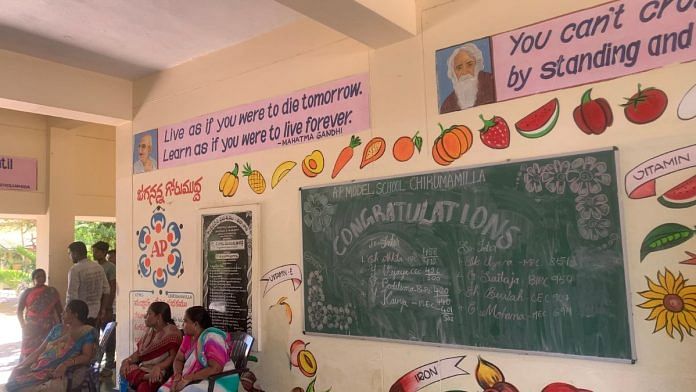Fourteen-year-old Telugu-speaking Jaishree commutes 40 km by bus to school from her village home. But that isn’t her biggest obstacle. Her life goal is to be an IAS officer for which she must master English. And nobody speaks English in her family, neighbourhood, or school.
But what’s giving her confidence now in ninth grade is a new bilingual textbook and a Byju’s tablet in her school bag—part of an ambitious, new learning innovation distributed to students across schools by the Andhra Pradesh government this year.
The bilingual textbooks innovation is meant to help students transition seamlessly from Telugu-medium education in primary schools and Telugu homes into English education. When they enter class 8, things are taken up a notch. All students will be provided Byju’s tablets, pre-loaded with videos and tests for mathematics, social studies, and science.
It is a smart marriage of mother-tongue politics and English-fueled aspirations, especially at a time when many northern states continue to view the pursuit of Hindi and English as binaries. The Telugu pages alongside English give equal weightage to both languages. And coupled with the tablet education content, Andhra Pradesh may just offer a winning template for government schools across India.
” If I face any doubts, I refer to the Telugu side. I use it mostly for science since I find physics hard,” Jaishree says, “We need to know English because it’s an international language.” For social studies, which is her best and favourite subject, the need to refer to Telugu is less.
“They teach us mostly in Telugu up to fifth standard,” says Jaishree who has just gone into class 9 at MPP school in Chirumamilla village, Old Guntur.
In the sixth standard, once most students enter the brave bad world of the English medium, their textbooks will no longer be enemies –– strange words swirling about. Instead, side-by-side, will be friendlier Telugu sentences, readily available for students to consult.
“A child who grows up with Hindi knows Hindi, Urdu boy knows Urdu,” says Andhra Pradesh education minister Botcha Satyanarayana, even though the YSR Congress government has given English a consistent and fervent push since it was elected in 2019. Now, the new textbooks-tablet initiative comes straight from Chief Minister Jagan Mohan Reddy. “They aren’t able to understand immediately. But without English, there is no use. My CM is very particular. We are creating a global citizen,” he says.
Outside Botcha’s office in the education ministry in Vijayawada, the road is lined with banners and billboards of the chief minister. There is Jagan smiling, holding onto a backpack. There is Jagan holding an Oxford English dictionary.
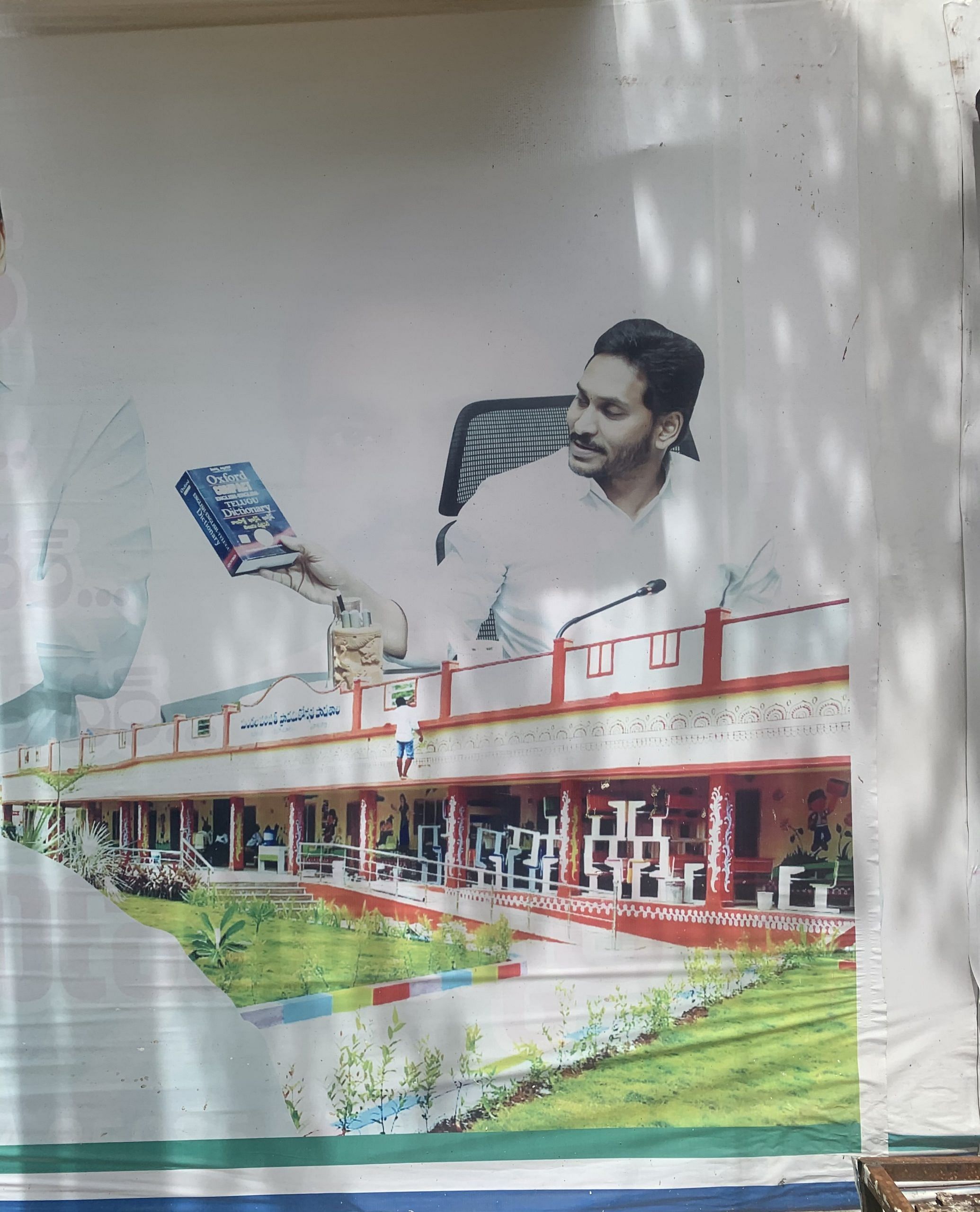
Also read: Aliens in Ajanta, Sita in Peru. Red FM show is rewriting Indian history, Hinduism
Indian Lord Clive
In 2021, bilingual textbooks were distributed in a staggered manner to class 8 students. The year 2022 marked the pilot project year. As of this academic year, which started in June, each student from classes 6 to 9 has been handed a package of fraternal-twin textbooks.
The only subject that doesn’t have a Telugu partner is the language itself — English. But there too, Madhavi who teaches English to classes 6 to 8 at MPP, adds some Telugu into the mix. “It is a little difficult for them to understand. I have to explain bilingually,” she says.
She instructs her students to mark out the difficult words and make sentences with them; tells them to learn one new word a day.
In a couple of years, for her sixth graders, these words may find their way into Byju’s tablets they will be given in class 8.
“When a child finds a word difficult, then they will consult,” says Suchitra, a physics teacher at MPP. She is in two minds about the reform. “There is no need as such for the bilingual textbook since in physics, terminology is clearly defined. Scientific terminology is completely different from Telugu to English,” she says.
Meanwhile, Nagabanu, a friend of Jaishree, is convinced it is going to be successful. “Whoever’s weak in studies, they can check Telugu and English,” she says. Regarding the switch, she sees it as a necessity. “Wherever we go, we have to speak in English only.”
The English turnaround cannot be instantaneous.
“They will try to speak in English, but initially they will speak in their mother tongue. After class 10, they will speak in English only,” says CV Ramanrao, principal of a Zilla parishad school in Pandaripuram, Chilakaluripet. In all zilla parishad (district) schools, the mode of learning is English.
Audiovisual aids for learning –– the tablets are filled with explainer videos –– entirely in English, are specialised for each topic. Once the videos have been watched, the student takes a practice test. After the practice test is completed, the app tracks their progress on a pie chart demarcated into subject-wise sections. Jaishree spends about an hour a day on Byju’s tablet, studying.
Madhav, a student of BRIG High School, toggles expertly. It’s been a full year and at this point, he is practically a Byju’s veteran. Social studies are his favourite subject too, and to study for his exams, all he does is watch Byju’s videos. His study plan has been arranged for him by his tablet.
An Indianised version of Lord Clive, the first governor-general of Bengal, appears on Madhav’s screen and begins to explain his contributions, reforms, and policies. Speaking in a North-Indian accent, Clive is still in his upturned white wig; allowing Madhav to visualise how students looked back then.
“This has been given to us by Jagan,” says Yadala Sujatha, his school’s PTA head, her eyes shining. There is supposed to be a sticker of the chief minister on the back of the tablet, but it has rubbed off. Laughing, but with seriousness edging her voice, she admonishes Madhav for its absence.
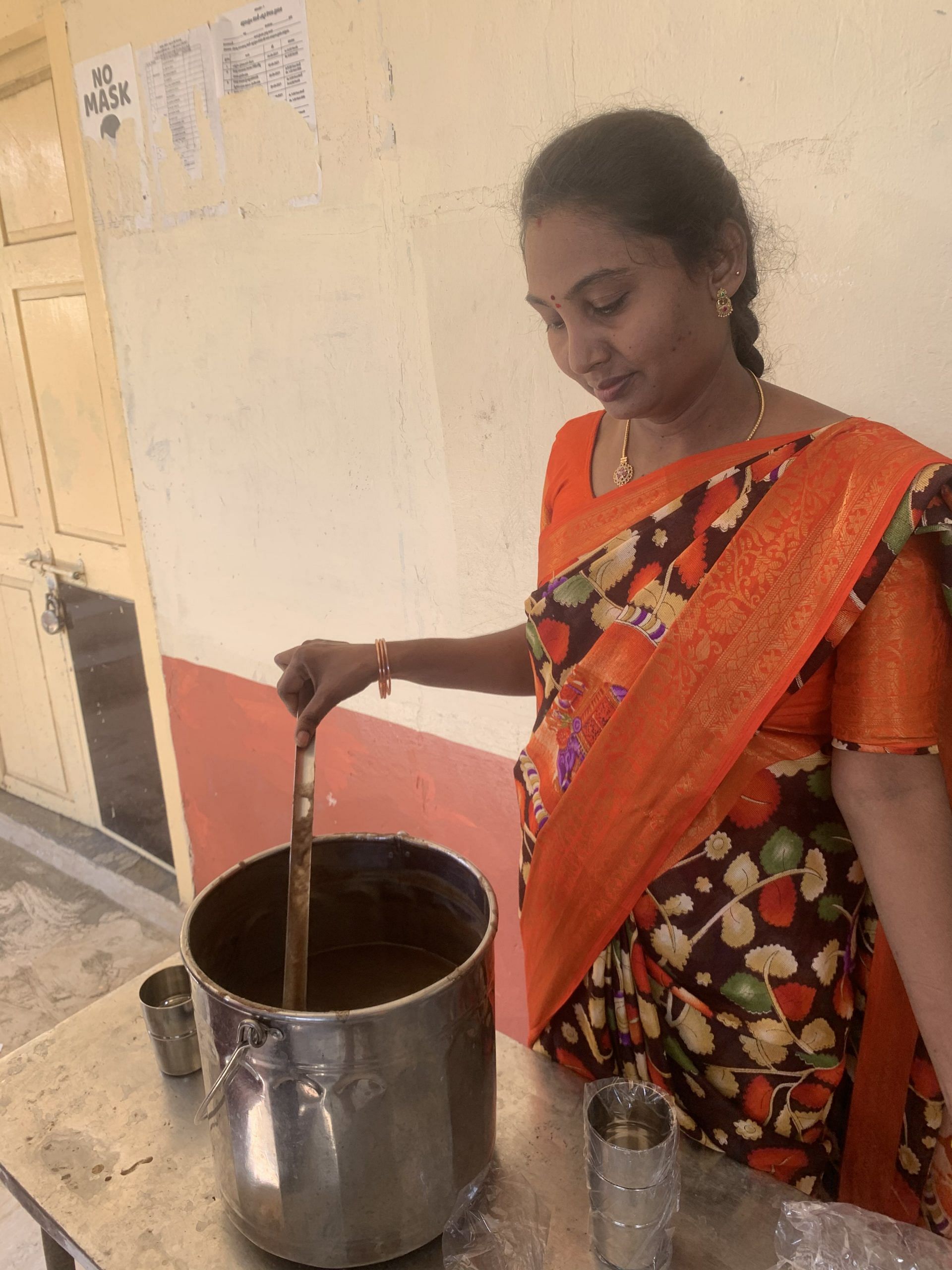
A faded banner of the Chief Minister flutters in the wind at the BRIG High School near the entrance.
Checks and balances
There are desolate palm fronds and insipid fields of wheat in Andhra Pradesh’s Old Guntur district; the land around has been dulled by the blistering heat. Nestled between all this, is Chirumamilla village, where MPP is, one of the state’s 45,000 government schools.
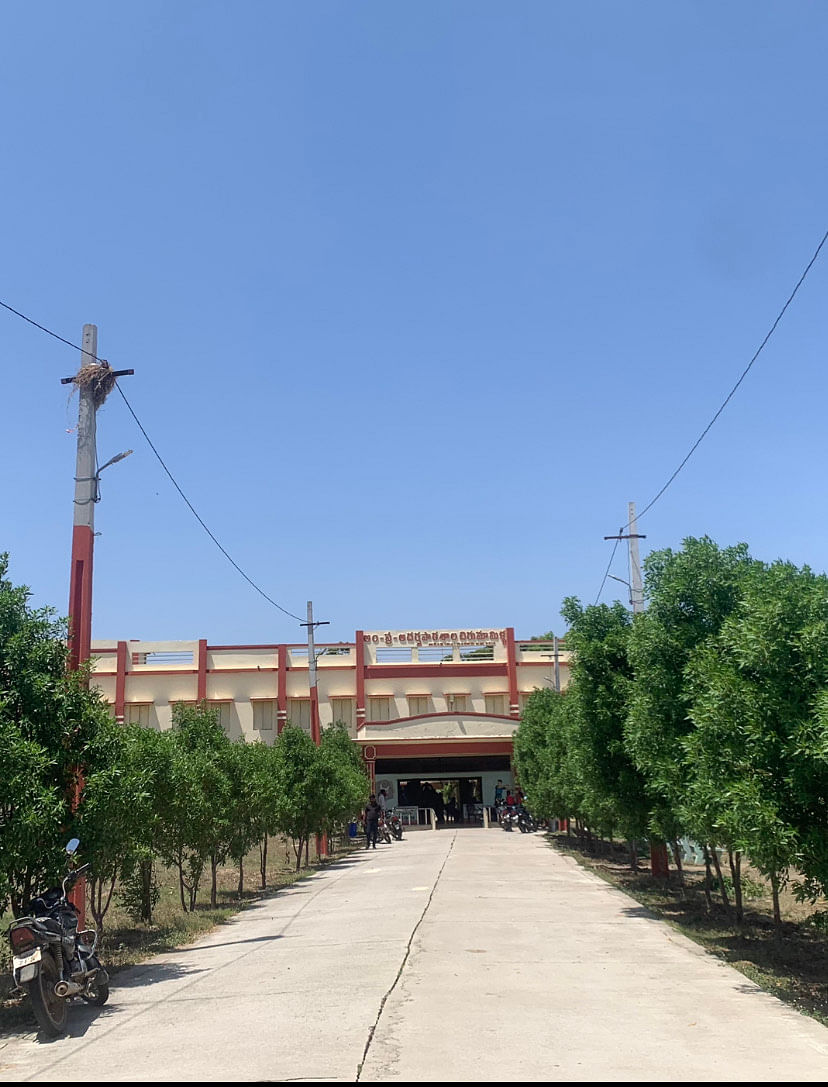
Quotes by many great thinkers of India cover the walls of the school accompanied by illustrations. They are all generic and BR Ambedkar, MK Gandhi and Rabindranath Tagore are hardly strangers to school walls. But at MPP, in a rural landscape, the quotes are in English, an example of how pervasive the language has come to be.
Teachers at the school say that not only have the bilingual textbooks and newfangled tablets smoothened the transition for students, but they’ve also made things easier for them. Even though the schools they attend are English medium, outside the classroom, be it with their peers or family members, students naturally converse in what is very much their first language, Telugu.
As teachers say, these students largely come from impoverished families. Their families work low-income jobs and are predominantly farmers and barbers, according to one teacher. They are illiterate. Yet, while Jaishree’s father is employed by the local government, Nagabanu’s father is an RMP (Registered Medical Practitioner) doctor. “My mother manages the family,” says Nagabanu.
They are definitive, clear-cut exceptions to the rule. Inside the classroom, the variance is starker–– some students are able to grasp concepts faster in English and others in their native language.
Those who are more comfortable in Telugu no longer require special attention from their teachers. They can consult the Telugu half of the page as soon as confusion sets in.
When it comes to Byju’s tablet, teachers use the content available as templates for their class tests. The practice tests given by Byju’s transcend the app and are given physical pen-and-paper form in class. “Teachers look at the tests too. It helps us as well, we become confident in our command over the subject,” says Sham, the social studies teacher at the MPP school.
Jaishree says the tablet is almost like a game. “I take the practice tests each day, and then I go onto the next level,” she says earnestly. She likes looking at pictorial representations of topics. “It’s very helpful for me to learn through pictures. Videos help me a lot.”
While the textbook and tech interventions are welcome aids, there are limitations. The primary limitation, as per MPP’s vice-principal Prasanna Kumar, is an atmosphere that isn’t conducive to learning. “We have to teach content, exercises, and do other things, we can’t create the full atmosphere,” he says. Once students go home, they are entirely on their own.
“Once they are absent for 2-3 days without informing us, we get worried,”
There is no fleshed-out system of checks and balances. Madhavi mentions a few of her students who were forced to start working, and the school wasn’t informed about it. “Once they are absent for 2-3 days without informing us, we get worried,” she says. When this happens, the teachers try their best to get in touch with students, and if the need arises, contact their parents.
The teachers navigate their way around unavoidable socio-economic disadvantages and focus on educating the kids. Madhavi’s voice is full of pride. Prior to joining Chirumamilla village’s model school last year, she had been placed at one of the state’s other model schools in 2015. Even without a trump card like the bilingual textbook, when she speaks to her students who have graduated, their conversations are held only in English. “Not a word of Telugu,” she beams.
Also read: IITs want to hold stake in businesses they help launch, send proposal to education ministry
Byju’s is the textbook
Botcha equates Byju’s tablet to the textbook. “Byju’s is easy for students, Byju’s is the textbook,” he says, as though there is nothing more to be said on the matter. He continues –– “in school, there is Byju’s, at home there is Byjus,” alluding to the fact that students take their tablets at home. In 2022, according to government data, 5,18,740 students of class 8 were given tablets preloaded with the content by the ed-tech company. Botcha also mentions the mechanism by which they can be repaired by ‘digital assistants’, spread across wards and villages, who are supposed to fix the tablet and return it within 3 days.
In the future, there may come a time when the government builds its own content, modelled on the CBSE, the board which approximately a thousand schools in the state are following. But for now, Botcha says, “Byju’s is best.”
Oxford dictionaries were distributed to students from grades 6 to 10. They haven’t been replaced by the bilingual textbooks as doubt-vanquishers but will continue to come in handy in English language classes.
Tech onslaught
The ultimate goal is to give parents, who’d ordinarily be more comfortable sending their children to private schools, a choice. Whether it is schools in urban areas, zilla parishad schools, tribal welfare schools, or the government model schools –– they should all be the same, says Botcha.
“Andhra Pradesh’s government schools scored top ranks. It’s the first time since Independence,” education minister says.
According to him, in the last cycle of class 10 board exams, government schools performed better than their private counterparts. “Government schools scored top ranks. It’s the first time since Independence,” he says. ThePrint was told that the data attesting to this pivot is yet to be collated.
The formula is simple. “If the atmosphere is good, parents will want to send their children to government schools,” Botcha says firmly. Part of this ‘good atmosphere’ is a tech-onslaught. As per the government, 15,750 schools are already being taught via IFP (Integrated flat-panels), a kind of digital blackboard. Earlier this month, a working committee was formed, with tech executives from Amazon to Microsoft — alongside high-level bureaucrats and education officials — to introduce AI, virtual reality, chatGPT, augmented reality and the works to schools. They are slated to submit their report on 15 July.
Back in MPP and in BRIG High School, students speak highly of their teachers. “They try to understand the students,” says Ponicha, a purple ribbon wound neatly around her two braids. Her school, MPP, was established in 2013 during Kiran Kumar Reddy’s stint in power. The school was English medium from the get-go.
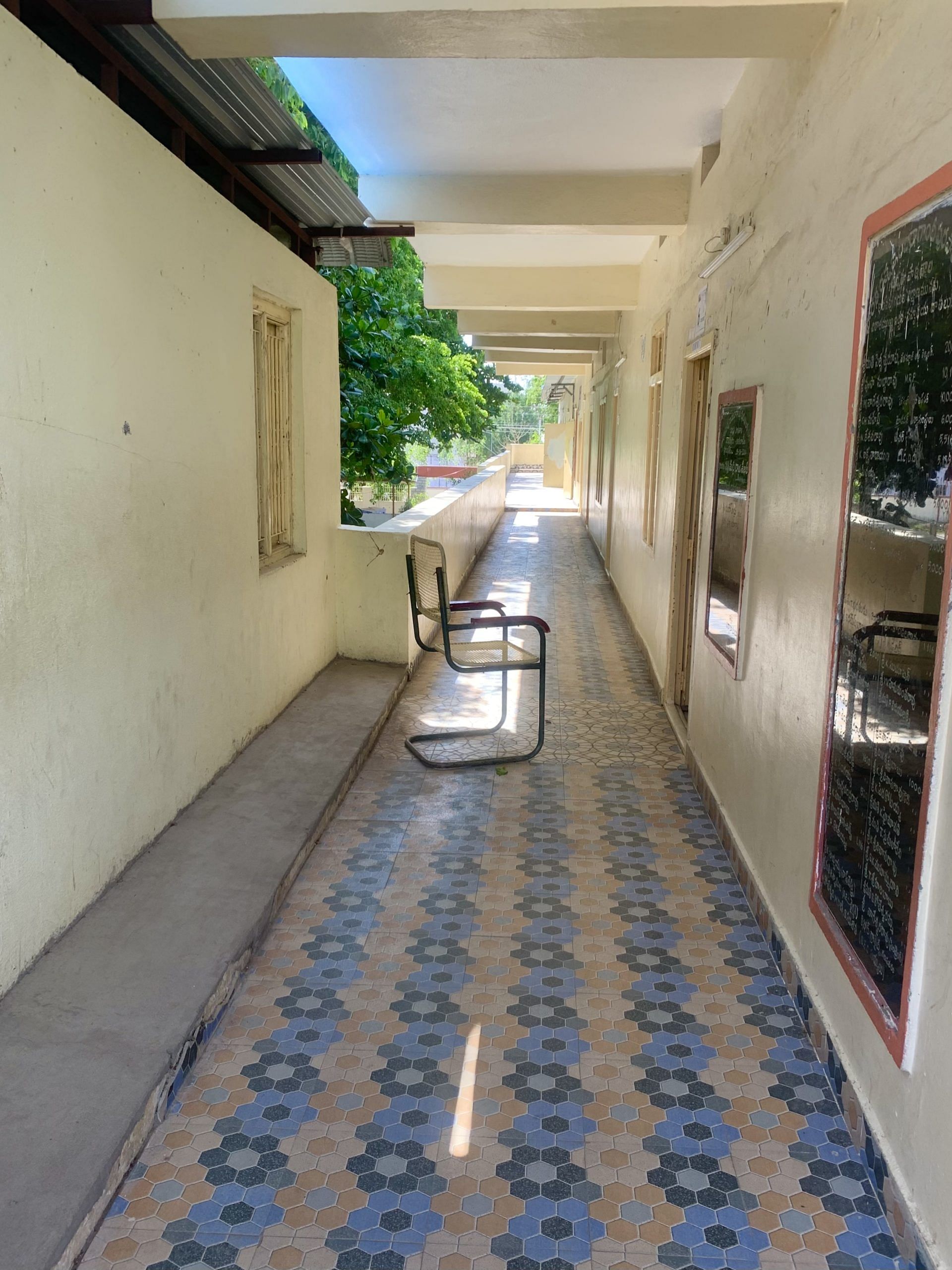
BRIG High School was converted later. It is home to 725 students. They loiter in the corridors, still in catch-up mode after the summer holidays. Classes haven’t started in full swing. “I only read in English,” Rajesh, a student, says, laughing — it is unclear whether he is being serious. The group of boisterous boys around him start yelling: they claim to do the same.
(Edited by Ratan Priya)


